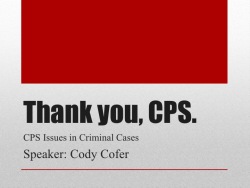Texas Child Protective Services (CPS) Cases
CPS Case? Call Child Custody Attorney Cody Cofer
CPS can be three of the most frightening letters a parent ever hears. Child Protective Services (CPS) Program is designed to protect children and to act in the children’s best interest. However, many people find themselves the focus of a Child Protective Services (CPS) investigation that has been initiated by false accusations of abuse or neglect. And yet, other family members may have grandchildren, nephews, nieces, or other loved ones that have been removed by Child Protective Services (CPS) and because of bad parenting the children are being swept away from the entire family. Parents or intervening family members should not brave the battle with Child Protective Services (CPS) without the help of a skilled family law attorney. Cody Cofer takes a strategic approach in CPS negotiations and courtroom representation of CPS cases. Every second you wait to contact Cody is possibly a second closer you are to having your children removed. Make no mistake, CPS has case workers and CPS Attorneys that are trained to build a case to support their recommendation. You need a skilled family law attorney in your corner.

Cofer – Speaker CPS Issues in Criminal Cases 2014
What is CPS supposed to do?
Through the Child Protective Services (CPS) Program, the Texas Department of Family and Protective Services (DFPS) focuses on children and their families and seeks active involvement of the children’s parents and other family members to solve problems that lead to abuse or neglect. The Child Protective Services (CPS) Program is intended to seek a solution that prevents harm to the child and to keep the child with his family when possible. However, CPS case workers often feel this objective cannot be obtained, so they recommend removal of the child from the family and placement with substitute families or caretakers, many times foster families. Child Protective Services (CPS) is supposed to work to provide permanence for a child in substitute care by resolving family dysfunction and returning the child to the family. Finally if the Child Protective Services (CPS) case worker thinks the family situation is unfixable (in the 1 year period allowed for these suits) the CPS case worker recommends termination of the parent-child relationship and permanent placement of the child with another family or caretaker. The Child Protective Services (CPS) Program tries to provide permanence for a child who cannot return to the family by recommending termination of the parent-child relationship or other suitable legal authorization for permanent placement of the child with another family or caretaker.
Privacy and the Child Protective Services (CPS) Program
Many of the “investigative” practices of Child Protective Services (CPS) Program implicate serious constitutional and statutory privacy issues. This is one reason you need a skilled Fort Worth Family Law Attorney to help protect you from unnecessary and unreasonable invasions of privacy and harassment. Child Protective Services (CPS) Program investigations invoke Fourth Amendment Protections. There are four primary examples of Child Protective Services (CPS) Program activities that invoke Fourth Amendment protection: (1) Entry of a home by Child Protective Services (CPS); Visual examination of a child by a Child Protective Services (CPS) worker; Transporting a child from school by Child Protective Services (CPS); and (4) Removal of a child by Child Protective Services (CPS). If CPS is attempting ANY of these actions contact Fort Worth Family Law Attorney Cody L. Cofer immediately! Call the Fort Worth Office (817) 810-9395.
Texas and Federal Basis for Child Protective Services (CPS)
DFPS’s Child Protective Services Program is based on federal and Texas laws. Federal laws, under which the program operates, are specified in the Social Security Act and interpreted through regulations published in the United States Code of Federal Regulations. Texas laws to protect children from abuse, neglect, or other harm have existed been around since 1931. DFPS is designated as the single Texas to administer Titles IV-B and IV-E of the Social Security Act. Texas Child Protective Services (CPS) state laws pertaining to children and families are the: Texas Family Code; the Human Resources Code; Texas Revised Civil Statutes Annotated, article 2351, Subsection 11; and the Texas Open Records Act.
Tarrant County Child Protective Services
2700 Ben Avenue
Fort Worth, Texas
(817) 255-8700
951 W. Pipeline Road #310
Hurst, Texas
(817) 255-2300
6743 Camp Bowie Blvd.
Fort Worth, Texas
(817) 989-3000
Cofer Law, P.C.300 Throckmorton StreetSuite 500Fort Worth, TX 76102